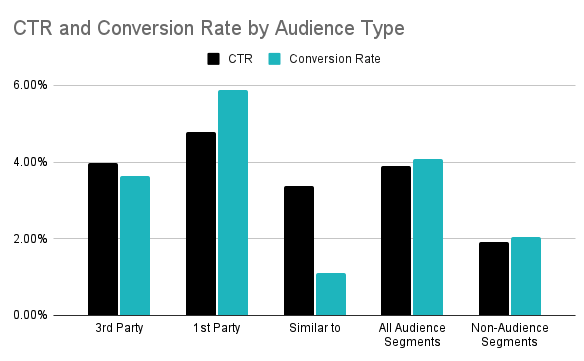Intro to using audiences in your Google hotel ads campaigns
Should You Be Using Audiences for Google Hotel Ads?
Study: Custom Audiences' Impact on Google Hotel Ads Performance
Throughout 2022, we’ve been surprised to discover that most hoteliers are completely unaware that many paid search strategies and techniques are available within your hotel metasearch advertising. Today we’re diving into a major targeting and reach strategy, custom audiences available for use on Google Hotel Ads.
Custom audiences are typically a cohort of users that have interacted with your brand and/or property in some way.
Here are a few examples:
- Past guest audience - Also referred to as 1st party audiences, a targeting list made up of people who have stayed with you in the past
- Behavioral audience - Web visitors segmented by specific events/actions, such as visiting your booking engine but not completing a reservation. Or a user who visited your rooms + specials/packages + events page but didn’t book
- Similar-to audience - A targeting list that uses your past guest or behavioral audience to find similar people with similar online behaviors likely to be interested in your property
These audiences are created using 1st party data. This means that the targeting lists (past guest, or behavioral tracking, or even seeds for your lookalike audiences) utilizes data you own or generate yourself from your website.
But there’s also 3rd party audience data available for your Google Hotel Ads metasearch campaigns. In this study we’re using a data provider who offers targeting lists using anonymized data points from billions of travelers worldwide.
Here are a few examples of common targeting lists generated by these types of data partners:
- Niche traveler profiles - Think wellness or adventure travelers
- Travel segments - Leisure, business
- In market travelers - Lists of travelers who have expressed interest in travel to your market. Some examples include researching or booking airfare and/or rental cars in your market within a certain date range.
Despite the use of custom audiences being commonplace for paid search campaigns, a number of metasearch providers simply don’t offer custom audience targeting as an option within Google Hotel Ads for their customers. So we decided to parse some of our internal data to measure the impact of this technique on metasearch advertising.
How do different Google Hotel Ads audience types perform?
Overall, audience segments in Google Hotel Ads campaigns not only perform with a higher click-through-rate (CTR), they also convert at almost double the rate as users classified as non-audience segments.

After dissecting the data, we’ve found that a hotel’s 1st party audiences not only have the highest engagement rate (CTR) with your Google hotel ads, they also convert much higher than other types of audiences and users that are not on any of the observed audience segments.
Following 1st party audience lists, Adara’s Cortex catalog audiences came in second for both conversion rate and click through rate. Similar-to audiences followed in click through rates but fell behind non-audience segment users in conversion rate.
Lastly, users classified as being in a non-audience segment produced the lowest CTR but squeaked in just above the similar-to audience in conversion rate.
Why do these Google Hotel Ads metasearch audiences perform better?
The data above shows that users classified as part of a 1st party or Adara audience perform better in terms of both CTR and conversion rate within Google Hotel Ads.
But let’s dig into why.
One major reason this approach yields better results is that you’re able to manage bid adjustments by individual audience type within Google Hotel Ads campaigns. This allows you to control budget by allocating between audiences that perform differently, seasonally for example.
It also allows you to tailor messaging to each audience separately to ensure relevance. You could also decide that you want to exclude specific audience types from some or all of your Google Hotel Ad campaigns depending on your objectives, which again, vary seasonally for most hotels and resorts.
One thing to note
Total visibility in Google Hotel Ads is still important.
While 1st party audiences directly from your database and 3rd party audiences from data providers perform the best in Google Hotel Ads in terms of CTR and conversion rates, impressions are much smaller and would limit your total revenue production if you used these alone.
Your non-custom audience campaigns will still be important as the foundation of your Google Hotel Ads metasearch advertising strategy by virtue of offering the bulk of your impression share.
So in short, a winning Google Hotel Ads metasearch advertising campaign strategy should include a variety of segments represented by custom audiences and individual campaigns that will perform to varying degrees throughout the year. You’ll also need a broad, prospecting-oriented campaign that will produce the lion share of your impression share and total revenue, even if CTR and conversion percentage is lower.
Summing it up
Long story short, the answer is yes. You SHOULD be using audiences within your Google Hotel Ads campaigns to refine your targeting and enhance your optimization efforts. How you use these audiences depends on your hotel’s goals with metasearch advertising and how you want to target (or exclude) the different audiences available.
If you’re not utilizing this strategy now, talk to your metasearch advertising provider about how you can apply custom audiences to your Google Hotel Ads campaign.
Or schedule a meeting to discuss how Metadesk helps you manage your metasearch advertising.


.jpg?height=200&name=Untitled%20design%20(2).jpg)
